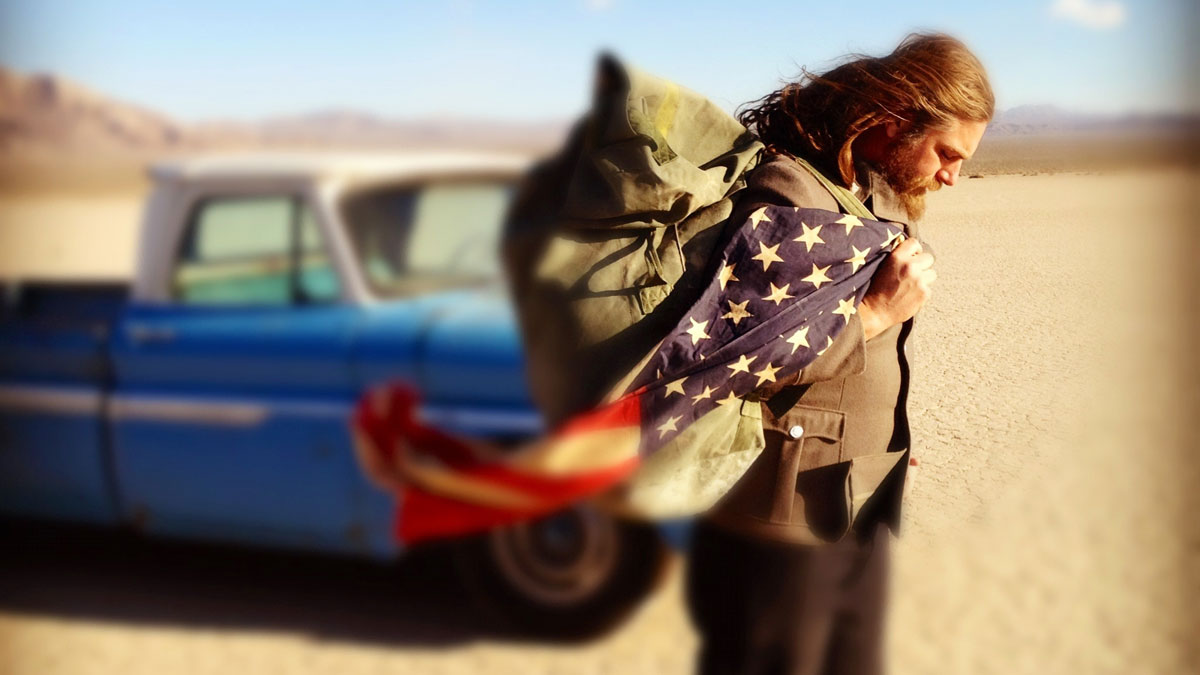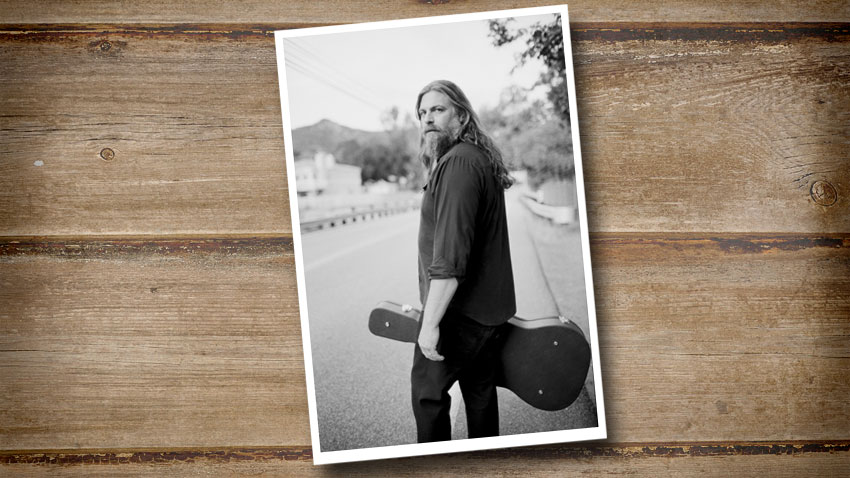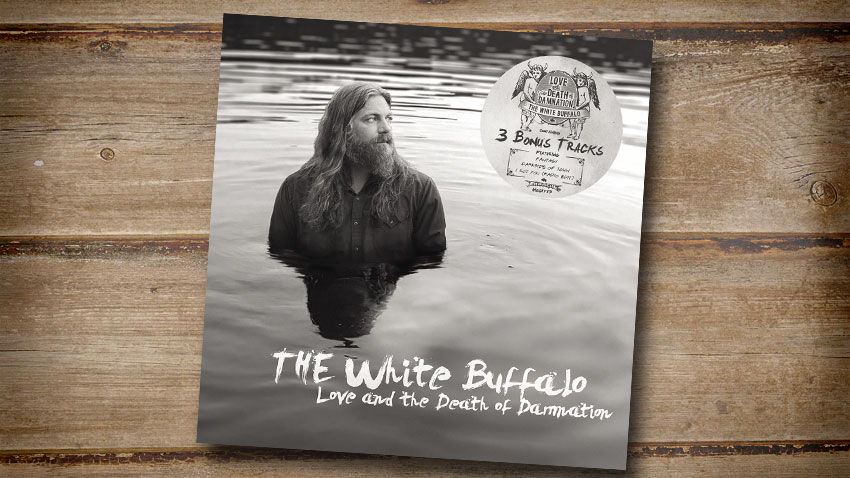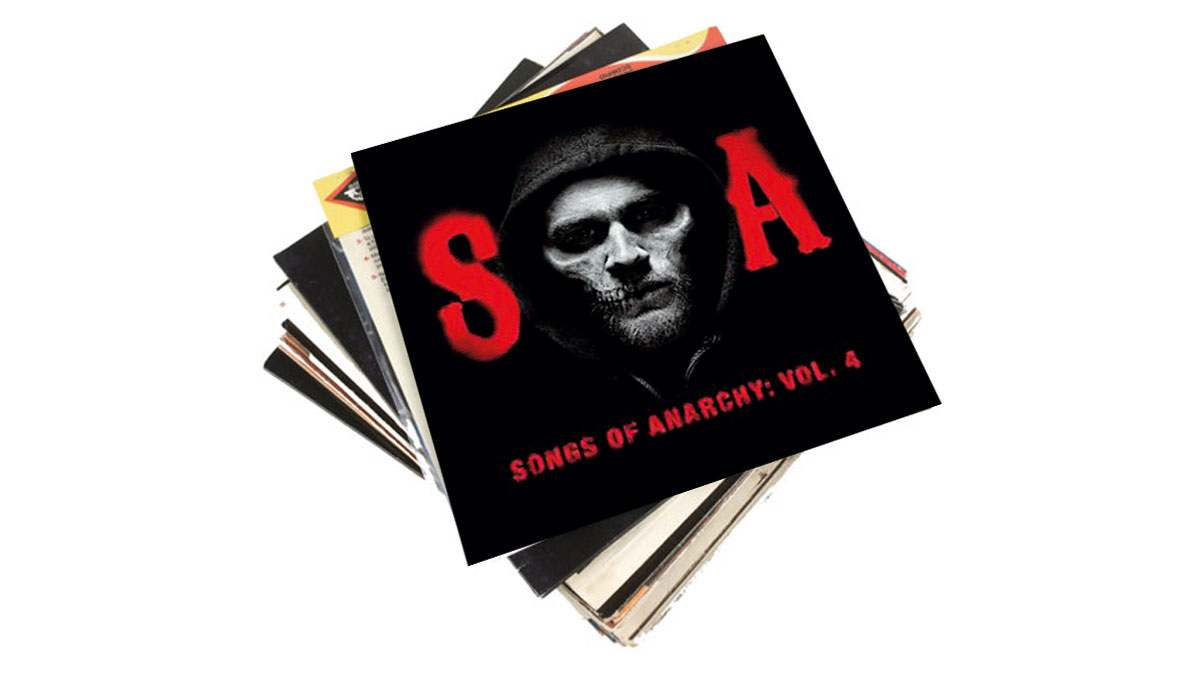Jake Smith, aka The White Buffalo, talks songwriting and Sons Of Anarchy
The baritone Buffalo on his story so far

Introduction
Where country and punk collide The White Buffalo can be found making a special kind of Americana. The artist otherwise known as Jake Smith talks songwriting, Sons Of Anarchy and surprising people with his voice.
One of the greats said it best; ‘All I want is the truth, just gimme some truth’. Amen, John Lennon. We’re always looking for it too, because that feeling of authenticity you get from an artist is often the very measure of their worth. That sense of truth; is this coming from the heart? Do they mean it?
It’s rooted deep in The White Buffalo’s songs. Whether he’s being autobiographical or sketching vivid tales of shady characters in frontier towns with his rich voice and dreadnought, there’s an undeniable gravitas to it all that can only come from an artist with an instinctive need to communicate.
Firstly, I didn’t know I could sing, I didn’t know I had this kind of voice. It was just there and came out
In return it commands the listener’s attention; when you become a White Buffalo fan, you tend to become a big one. It’s found the songwriter, known to his friends as Jake Smith, being compared to Johnny Cash (the storytelling and outlaw spirit) and Eddie Vedder (the deep baritone and punk rock intensity), while reaching a worldwide audience through his songs’ inclusion on the hit television series, Sons Of Anarchy.
As his fourth album, Love And The Death Of Damnation, gets a European release, we hunted Jake down to talk about the man behind the music.
Did songwriting follow quite quickly for you after you picked up a guitar?
“I think I was 19 when I fi rst started playing and it really did. I didn’t learn other people’s songs, I just started writing songs. Not with an agenda to become a musician or a songwriter. It was just kind of what I did. Not destiny but… even after a while I still didn’t consider myself an ‘artist’ when I was writing the early songs. Once I learned two songs, I started writing songs. As primitive as they were!”
All writers lose confidence at times, did you have people around you encouraging you to pursue this?
“Yes, my parents and friends. Firstly, I didn’t know I could sing, I didn’t know I had this kind of voice. It was just there and came out. I never did any choral thing… any singing at all [before that] and then to discover this odd resonance that I had naturally was kind of surprising and shocking to most people. But there was definitely encouragement to keep going.
“It’s one of those things where you’ve got to stay with it, believe in yourself and believe in what you’re doing but outside encouragement always helps of course.”
Your songs featuring on soundtracks seems to have played an important role in different stages on your career, let's go back to the first time with the surf movies Shelter and then Single Fin Yellow - how did that affect things for you?
You get these steps in your career and they kind of legitimise you, even in your own mind; not in just peoples' minds
“With the first one, Shelter, I was still living in San Francisco at the time and this surf film maker called me up and said he wanted to use one of my songs in his film [Wrong] and at the time I wasn’t really doing anything. I was living in San Francisco and almost all the small clubs at that time had converted to be DJ orientated so there weren't that many small clubs to come up in as an artist. But that gave the push to say, I should be doing this. So I quite my job and moved down to Southern California, close to Los Angeles. I started that career and haven't really had much of a job other than music from that point on.”
And you used to make tapes of your songs for friends, had they been circulating at the time too?
“I would send these cassette tapes out for Christmas and peoples' birthdays, and one of my friends worked in the surf industry, he was like a rep or something, and people started bootlegging these cassette tapes. I had no idea. They asked me to perform for the launch of Shelter and people knew the song that was in the film, but they also knew the words of some of the other songs I was singing. And I was thinking, 'what's going on here?' So that was kind of a motivator. These little mixtapes or 10-20 songs had circulated and I had a small fanbase that was unbeknownst to me.”
Did you have doubts before then that there was an audience out there for you?
“Yes, sure. It took me a while even after I'd started recording. You get these steps in your career and they kind of legitimise you, even in your own mind; not in just peoples' minds. The feeling it matters, that you're doing the right thing… it took a while. There's always self doubt.”

Learning the craft
When did the longer touring runs kick in for you?
“It's probably been about ten years or really playing and touring, rather than playing in the corner of some restaurant; a sushi bar or something strange. I got some early opportunities to open up for some people and that was my first introduction to Europe and Japan.
Even when I'd play solo, I'd do it until I could afford to bring a band out. I'd go out, do my solo gig and try to be as dynamic and powerful as I can be
“Opening for Xavier Rudd and Donavon Frankenreiter and then started building my fanbase from there. But it's probably been ten years since I've been back, it was this last tour and it was amazing to see how this fanbase had grown. The TV placements have obviously helped but it's pretty amazing to see 600 or 700 people come out in Warsaw Poland.”
For an acoustic artist, holding the attention of the room can be challenging sometimes. How did you handle that in the beginning?
“I've always been focussed on songs. Even when I'd play solo, I'd do it until I could afford to bring a band out. I'd go out, do my solo gig and try to be as dynamic and powerful as I can be. Every time I've opened for someone, I've done it solo. The band is a different thing. When you're by yourself there's an intimacy and it's only about that; the words, the songs and the feel. The emotion of things. With the band we can take that emotion to different levels and get people moving more.”
So writing came first; you were honing your craft as a songwriter before going out regularly to perform?
“It was years. Even after I started writing it was years. I ended up starting a band for six months knowing like four chords, then we started playing live and we were pretty horrible. But at least it was a start. But then I holed up on my own. I’d play solo shows once or twice a year for the first five years but I was always writing songs.
“It was honing that craft but not really bringing it to people. And at that point I didn’t have anything in my life, I was partying and drinking in San Francisco. I didn’t really have the tools to get shows or find management or anything.
I write the majority [of songs] in this kind of narrative style and I’m not exactly sure where it came from
“It was only when I moved to LA that I really started to focus, and when I met my wife who kind of cleaned me up a little bit to realise that this is what I should do and what I really need to focus on.”
On reflection, do you think it was beneficial that you had that time to work out where you were as writer, to develop your style as a writer first and foremost?
“I really do. I write the majority [of songs] in this kind of narrative style and I’m not exactly sure where it came from. I never wrote poetry or short stories. Looking back it’s still kind of how I work today. It’s rare - 100 per cent of what I’ve recorded on my albums is just from myself, from one mind. Which is a rare thing these days. To have that time where I was honing it and creating my own thing, at least allowed it to be something singular or something unique to what I do, and what we do as a band.”
There’s obviously a country element to your music, was it an important part of your life growing up?
“Yes it was a huge part. This was way before I even had a guitar or writing songs. I would go to country music concerts with my family and that was one of our family outings; we’d go camping and then go to country music concerts.
A lot of the songs on the dark side are complete imagination, then there’s some stuff that comes from personal experience
“Growing up in southern California, it wasn’t a huge hub for country music but by the time I’d got a guitar I had seen 40 or so country music concerts. Then I got to high school and I started listen to punk almost exclusively and everything on the radio I thought was bullshit.
“I started really getting into that aesthetic, which still bleeds in as well. This genre-bending thing; it is kind of country, but it’s rock and there’s some punk aesthetic in there. I’m always trying to grow that.
“Once I got my guitar I started to settle into the great songwriters; guys like Leonard Cohen and Townes Van Zandt, Bob Dylan, Elliot Smith. People who’s words matter; in every moment the lyrics are as important as the melody. There’s really no fluff or filler; each word and moment has a purpose.”
It sounds like you’ve carried that idea forward in your own songs…
“I try to keep it honest, albeit some of my songs are about totally fantastical stories of drug deals gone bad or murder. A lot of the songs on the dark side are complete imagination, then there’s some stuff that comes from personal experience and way more autobiographical. But skewed, twisted versions of the truth.”

True grit
There was preproduction for this record, was that a first for you?
“That is a first for me. This time we went in and recorded in two different batches of songs. We did preproduction on the first six, worked out arrangements, which helps me to figure out where to move songs and story along along and what kind of space and time I have in order to make every moment count.”
Did it expand the sound in terms of layers?
There's some swampy grooves, there's stuff that was a little outside my comfort zone that both producers and Matt helped out with
“I think it just made it quicker, I'm not sure if it necessarily expanded it. Essentially we had the same players, with the exclusion of the old bass player, and we had Bruce Witkin who is also one of the producers, sitting in on bass the whole time, fleshing out these songs and figuring where they need to go.”
Does that help, having a producer that's also directly involved from the musician perspective too?
“Yes, it's great to get that feel. He's an insane bass player too which is a plus. We get to really work it out in the pre-production page, working out arrangements and bass and drum parts at the same time. It's a real luxury to have him in the room throwing his ideas out.”
You and drummer Matt Lynott seem to have a real chemistry with the rhythms in your music, have you influenced each other?
“He's a diverse drummer and he can do all kinds of stuff. With my sound he's kind of the perfect drummer. He's very dynamic and we play as a three piece when we go out so having him as part of the show, you could watch him the whole time you know. We influence each other, I would imagine. I kind of have my own style of writing and on this album we try to expand a little bit more on some of the grooves. There's some swampy grooves, there's stuff that was a little outside my comfort zone that both producers and Matt helped out with.”
Come On Love, Come On In is a surprise in that way on the album, it's a soul song and vocally you're moving outside of familiar places. How did it come about?
“I write mostly in my garage and I was just messing around doing more soul and gospel styles and I actually converted that song from a finger picking acoustic, more of a folk, style into this grander gospel song. I definitely wanted to make a conscious effort to expand and go further to get out of what is my normal, that as a songwriter you tend to have. Certain things that you go to; certain chords and rhythms you play. To try and get outside of that is cool and it's a good growth thing, because you've got to keep moving and going forward, doing different things.”

Fortunate Son
You’re playing a rhythmic role in a trio with drums and bass live and on record, how does that affect your approach to the sound?
“Sometimes I go through the PA, and sometimes I’ll play through a Twin Reverb, or I have a Music Man. I’ll bring them out when we’re not doing fly-in dates. I have a newer Music Man that I’m playing, and it’s good to have a little more attack; our live show is pretty aggressive so to be able to cut through the mix it’s good to have a little more grit on it. So I often play through an electric amp, not an acoustic amp. It’s a rarer sound than other people are going for.
Our set is an hour and a half and I’m singing for about an hour and 28 minutes of that. There’s no leads, jamming or hula hooping
“An acoustic isn’t often used as the lead instrument, it’s often buried in the mix and it’s all about the other instruments. But when it’s only three guys and that’s really your only instrument, other than the bass and rhythm tracks. And we’re about as far from a jam band as you can get; our set is an hour and a half and I’m singing for about an hour and 28 minutes of that. There’s no leads, jamming or hula hooping.”
How did the Sons Of Anarchy TV series come into your life?
“It was actually my lawyer. I didn’t have management or any representation at the time other than a lawyer. He called the music supervisor [for the show] who he had a loose connection with and asked him to lunch. He pitched me as a really good fit for the show.
“The idea that I write a lot of songs that are conflicted emotionally and a lot of stuff dives into the shadowy realms of good and evil. He saw the parallels in my music with the show and then they just started using my songs. Then ultimately they had me come in and sing stuff, to really become part of the sound of the show. It was huge for me.”
You perform Come Join the Murder, the song that soundtracks the poignant closing scene of the final episode. Was that a very different experience for you as it was someone else's visions of a song?
“It was essentially Kurt Sutter, the writer and creator of the show as well as an actor on it for a while… until he died in it. He wrote the lyrics entirely and I sort of tweaked them here and there to make them singable but almost the whole song was written by him. I got a sheet of paper with the lyrics written on it and then me and the music supervisor Bob Thiele put it to music and melody. It was a different process, for sure. Singing something that's not your own words is a little bit… it's harder to feel it, for me. But it was a cool experience, and it was crazy - it's crazy to see your name up there between Justin Bieber and Rhianna.”
Did you know at the time what scene the song would soundtrack?
“No, initially that wasn't the plan. Initially it was supposed to be three episodes earlier and I think Kurt heard what we did with it and just fell in love with it and wanted it to be the finale song. So it wasn't initially slotted for that space, they moved it because he liked it so much.”
Were the effects quite immediate?
“Yes, on a nightly basis I would see people commenting on social media. People would find out about us but the luxury I had was having so many tracks on it, they used seven or eight of my compositions that weren’t written for the show and just my own songs, and [people] kept on hearing this voice and these songs.
“Ultimately, they would dive deeper and go back through the catalogue. It surprises me that I’ll go to a new place and a bunch of people will come out. I think that show has been solely responsible for a lot of that.”
But would you say word of mouth still matters a lot for live artists, too?
“I think that’s been my hugest asset. I think that TV placements have helped a lot because you’re putting it in the mind and ears of millions of people, but ultimately it is the word of mouth. And I don’t think it’s until people come out to live shows that you really hook them. If they come out and enjoy it and have an experience, then you’ve got a fan for life.”
The White Buffalo plays the following European dates in July:
Sun 17 – Bristol, The Lantern
Mon 18 – Newcastle, 02 Academy 2
Tue 19 – Glasgow 02 ABC
Thur 21 – London, Electric Ballroom
Fri 22 – Birmingham, 02 Institute 2
Sat 23 – Maidstone, Ramblin’ Man Fair
Mon 25 – Hamburg, Germany – Knust
Tue 26 – Frankfurt, Germany – Batschkapp
Thur 28 – Faenza, Italy – Strade Blu Festival
Fri 29 – Trieste, Italy – Hot In The City Festival
Click here for tickets

Rob is the Reviews Editor for GuitarWorld.com and MusicRadar guitars, so spends most of his waking hours (and beyond) thinking about and trying the latest gear while making sure our reviews team is giving you thorough and honest tests of it. He's worked for guitar mags and sites as a writer and editor for nearly 20 years but still winces at the thought of restringing anything with a Floyd Rose.

